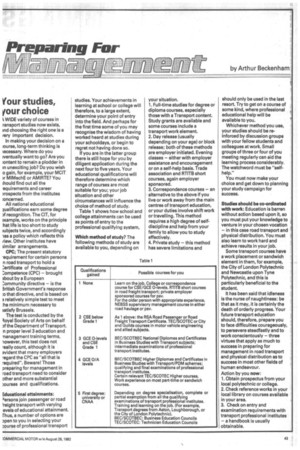four studies /
Page 37

If you've noticed an error in this article please click here to report it so we can fix it.
four choice
k WIDE variety of courses in ransport studies now exists, Ind choosing the right one is a retry important decision.
In making your decision on a :ourse, long-term thinking is secessary. Where do you oventually want to go? Are you :ontent to remain a plodder in in unexciting job? Do you wish o gain, for example, your MCIT sr MIMechE or AMIRTE? You ihould find out all the equirements and career Kospects from the institutes :oncerned.
All national educational tualifications earn some degree af recognition. The CIT, for sxample, works on the principle hat life is too short to study subjects twice, and accordingly sas a policy which reflects this new. Other institutes have similar arrangements.
CPC; The present statutory requirement for certain persons n road transport to hold a :ertificate of Professional :ompetence (CPC) — brought sbout by a European :ommunity directive — is the 3ritish Government's response :o that directive, and is based on ) relatively simple test to meet he minimum necessary to satisfy Brussels.
The test is conducted by the ioyal Society of Arts on behalf g the Department of Transport. n proper level 3 education and rianagement training terms, lowever, this test does not really count, although it is Dvident that many employers regard the CPC as "all that is required". Beware! Those preparing for management in road transport need to consider other and more substantial :ourses and qualifications.
Educational attainments: 'arsons join passenger or road Freight transport with varying evels of educational attainment, rhus, a number of options are open to you in selecting your ourse of professional transport studies. Your achievements in learning at school or college will therefore, to a large extent, determine your point of entry into the field. And perhaps for the first time some of you may recognise the wisdom of having worked heard at studies during your schooldays, or begin to regret not having done so.
If you are in the latter group there is still hope for you by diligent application during the next four to five years. Your educational qualifications will therefore determine which range of courses are most suitable foryou; your job situation and other circumstances will influence the choice of method of study.
Table 1 shows how school and college attainments can be used as points of entry to the professional qualifying system, Which method of study? The following methods of study are available to you, depending on your situation.
1. Full-time studies for degree or diploma courses, especially those with a Transport content. Study grants are available and some courses include a transport work element.
2. Day release lusually depending on your age) or block release; both of these methods are employer initiated. Evening classes — either with employer assistance and encouragement or on a self-help basis. Trade association and RTITB short courses, again employer sponsored.
3. Correspondence courses — an alternative to the above if you live or work away from the main centres of transport education, or your duties involve shift work or travelling. This method requires a high degree of selfdiscipline and help from your family to allow you to study effectively.
4. Private study — this method has severe limitations and should only be used in the last resort. Try to get on a course of some kind, where professional educational help will be available to you.
Whichever method you use, your studies should be reinforced by discussion groups with your fellow students and colleagues at work. Small groups of three or four of you meeting regularly can aid the learning process considerably. The watchword must be "selfhelp."
You must now make your choice and get down to planning your study campaign for SLICCeSS.
Studies should be co-ordinated with work: Education is barren without action based upon it, so you must put your knowledge to venture in your chosen vocation — in this case road transport and physical distribution. You must also learn to work hard and achieve results in your job.
Some transport courses have a work placement or sandwich element in them, for example, the City of London Polytechnic and Newcastle upon Tyne Polytechnic, and this is particularly beneficial to the student.
It has been said that idleness is the nurse of naughtiness: be that as it may, it is certainly the death of orderly progress. Your future transport education should, therefore, prepare you to face difficulties courageously, to persevere steadfastly and to work conscientously — three virtues that apply as much to success in preparing for management in road transport and physical distribution as to success in most other fields of human endeavour.
Action by you now: I. Obtain prospectus from your local polytechnic or college.
2. Check reference works in your local library on courses available in your area.
3. Check on entry and examination requirements with transport professional institutes — a handbook is usually obtainable.








































